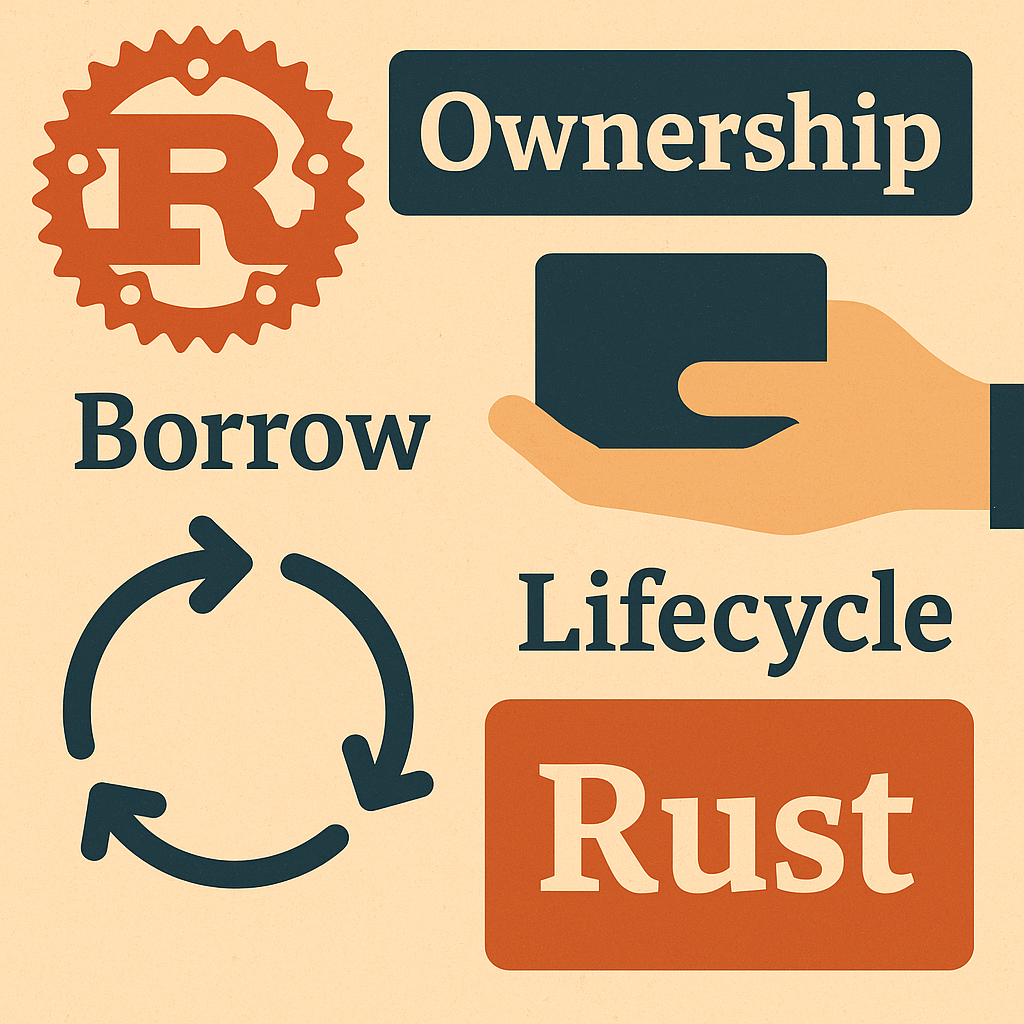One of Rust’s most powerful—and at first, most confusing—features is its ownership system. Unlike garbage-collected languages like Java or Python, Rust manages memory without a garbage collector, instead relying on strict compile-time rules to ensure memory safety and prevent data races.
In this article, we’ll dive into three foundational Rust concepts:
- Ownership
- Move semantics
- Lifetimes
We’ll go step by step with practical examples and explanations so you can truly feel how Rust thinks about memory.
🧠 Ownership: One Owner at a Time
Rust follows a simple rule:
Every piece of data has a single owner. When the owner goes out of scope, the data is dropped.
Example:
fn main() {
let s = String::from("hello"); // s owns the String
println!("{}", s); // works fine
} // s goes out of scope and memory is freed
Now look what happens when we try to assign s to another variable:
fn main() {
let s1 = String::from("hello");
let s2 = s1; // ownership of the String is moved to s2
println!("{}", s1); // ❌ compile-time error: s1 is no longer valid
}
Rust moves the value instead of copying it (unless the type implements Copy). This avoids double-free errors at runtime.
🔁 Move Semantics vs Copy
For primitive types (like integers), Rust copies the value instead of moving it:
fn main() {
let x = 5;
let y = x; // x is copied, not moved
println!("x: {}, y: {}", x, y); // ✅ works fine
}
But with heap-allocated types (like String, Vec), the default behavior is move.
📦 Clone: If You Really Need a Copy
You can explicitly clone a value if you need two independent owners:
fn main() {
let s1 = String::from("hello");
let s2 = s1.clone(); // deep copy
println!("s1: {}, s2: {}", s1, s2); // ✅ both work
}
Use clone() carefully—it can be expensive!
🔄 Function Ownership Transfer
Ownership also applies to function calls:
fn takes_ownership(s: String) {
println!("Got {}", s);
} // s is dropped here
fn main() {
let hello = String::from("hi");
takes_ownership(hello); // moves ownership
// println!("{}", hello); // ❌ error: moved value
}
To keep using the original variable, return it back:
fn take_and_give_back(s: String) -> String {
s
}
fn main() {
let s = String::from("yo");
let s = take_and_give_back(s); // ok: s gets ownership again
println!("{}", s);
}
🔗 Borrowing: Access Without Taking Ownership
Rust allows references through borrowing:
fn print_length(s: &String) {
println!("Length is {}", s.len());
}
fn main() {
let s = String::from("world");
print_length(&s); // passes a reference
println!("{}", s); // ✅ s is still valid
}
This is a shared borrow, meaning read-only access. You can have multiple shared borrows, but only one mutable borrow at a time.
Mutable Borrow:
fn add_exclamation(s: &mut String) {
s.push_str("!");
}
fn main() {
let mut s = String::from("hi");
add_exclamation(&mut s);
println!("{}", s); // ✅ prints "hi!"
}
⏳ Lifetimes: Ensuring Valid References
Lifetimes are Rust’s way of ensuring that references are always valid. Often, the compiler can infer lifetimes, but in complex cases, you’ll need to annotate them.
Invalid Reference Example:
fn dangling() -> &String {
let s = String::from("oops");
&s // ❌ returns reference to a value that’s about to be dropped
}
Fix with Lifetimes:
fn longest<'a>(a: &'a str, b: &'a str) -> &'a str {
if a.len() > b.len() { a } else { b }
}
fn main() {
let s1 = String::from("abcd");
let s2 = String::from("xyz");
let result = longest(&s1, &s2);
println!("Longest: {}", result);
}
Here, 'a tells the compiler that the returned reference will live as long as both inputs.
🔐 Summary
| Concept | What It Does | Example Syntax |
|---|---|---|
| Ownership | Each value has one owner | let s = String::from("hi"); |
| Move | Transfers ownership | let s2 = s1; |
| Borrowing | Pass reference without taking ownership | fn foo(s: &String) |
| Mutable Borrow | Allows mutation via a reference | fn foo(s: &mut String) |
| Lifetimes | Ensure references are valid for required scopes | fn foo<'a>(x: &'a str) |
🧪 Try It Yourself
Want to play with ownership and borrowing rules? Check out the Rust Playground and test these snippets live.
✍️ Final Thoughts
Rust’s ownership system is strict—but it eliminates entire classes of bugs at compile time. Once you internalize the model, you’ll find yourself writing safer, more predictable code in any language.
Mastering ownership, borrowing, and lifetimes is the first major step toward becoming fluent in Rust.
Have questions or tips? Drop them in the comments or reach out on [LinkedIn/Instagram/FAcebook]!

Comments
One response to “🔐 Understanding Ownership, Move Semantics, and Lifetimes in Rust”
📚 Official Rust Resources
The Rust Programming Language (a.k.a. The Book)
https://doc.rust-lang.org/book/
Chapters:
4.1 Ownership
4.2 References and Borrowing
4.3 The Slice Type
10.3 Lifetimes
Rust Reference (official language reference)
https://doc.rust-lang.org/reference/
The Rustonomicon – For unsafe and deeper understanding of memory models
https://doc.rust-lang.org/nomicon/
🛠 Playground for Live Testing
Rust Playground (try examples online)
https://play.rust-lang.org/
🧠 Community and Deep Dive Articles
Rust by Example
https://doc.rust-lang.org/rust-by-example/
“Common Rust Lifetime Misconceptions” – by Alexis Beingessner (withoutboats)
https://github.com/pretzelhammer/rust-blog/blob/master/posts/common-rust-lifetime-misconceptions.md
“Understanding Ownership in Rust” – LogRocket Blog
https://blog.logrocket.com/understanding-ownership-in-rust/
“Fearless Concurrency with Rust” – Mozilla Hacks Blog
https://hacks.mozilla.org/2015/07/rust-concurrency/